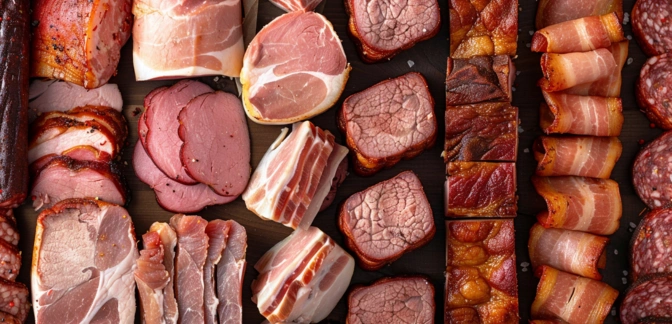Bacon — Nutrients, Health Benefits, And Shopping Tips

Written by Listonic Team
Last update on September 4, 2024
Nutrients
Nutrition facts
Amount per 100 g
Calories
🔥 541 kcal
| Nutrition per: 100 g | Value | % Daily Value* |
|---|---|---|
| Carbs | 1 g | 0.36% |
| Fiber | 0 g | - |
| Sugars | 0 g | - |
| Glycemic Index | 0 | - |
| Protein | 37 g | 74% |
| Sodium | 1800 mg | 78.26% |
| Total Fat | 42 g | 53.85% |
*The % of Daily Value (DV) tells you how much a nutrient in a serving of food contributes to a daily diet. 2,000 calories a day is used for general nutrition advice.
37 g
💪 High Protein Content
Key takeaways
Health benefits
- Rich in protein, which is essential for muscle growth and repair.
- Contains essential vitamins and minerals such as B vitamins (B1, B2, B3, B6, and B12), zinc, and iron, which support overall health and well-being.
- Source of healthy fats when consumed in moderation, providing energy and supporting cell function.
- Contains choline, which is important for brain health and development.
Health risks
- High saturated fat content which can contribute to increased cholesterol levels and raise the risk of heart disease.
- High sodium levels which can lead to hypertension and increase the risk of stroke and heart disease.
- Presence of nitrates and nitrites which are used in curing bacon and have been linked to an increased risk of cancer, particularly colorectal cancer.
- Processed meat risks as bacon is classified as a processed meat, which has been associated with higher risks of various chronic diseases, including cancer.
How to choose bacon
Look for bacon with a rich, vibrant pink color, indicative of good curing practices, and evenly distributed streaks of fat which enhance flavor when cooked. The fat should be creamy white rather than yellow, which can signal age. Freshness is key, so ensure the bacon is well within its sell-by date.
Avoid bacon that looks overly wet or has a slimy sheen, which can suggest poor handling or storage. Also steer clear of packages with too much liquid as this can indicate a product that has been stored too long.

How to store bacon
Uncooked bacon should be stored in the refrigerator and used within a week of purchase. Keep it in its original packaging or transfer it to an airtight container to maintain freshness. For longer storage, freezing is an effective option, with bacon lasting up to a month in the freezer.
Exposure to air can cause bacon to spoil or become rancid, so always ensure it is tightly sealed. Do not leave bacon at room temperature for extended periods, as it can quickly become unsafe to eat. Thaw frozen bacon in the refrigerator, not on the counter, to prevent bacterial growth.
✅ Extra Tip
How long does it last?
Bacon can last for 1-2 weeks in the refrigerator if unopened. Once opened, it should be consumed within 7 days. Cooked bacon can be stored in the refrigerator for 4-5 days. For longer storage, bacon can be frozen for up to 6 months.
What to do with leftovers?
Leftover bacon can be a flavorful addition to many dishes. Crumble it over salads or soups for a savory crunch, or mix it into scrambled eggs or frittatas for a hearty breakfast. Bacon is also a great topping for pizzas, burgers, or baked potatoes, where it adds a smoky flavor.
Use bacon in sandwiches like BLTs, or chop it up and add it to macaroni and cheese for an indulgent twist. If you have a lot of bacon, consider making a bacon jam or using it to wrap around meats like chicken or shrimp before grilling. Bacon can also be incorporated into quiches or casseroles, where it adds depth and richness. For a unique snack, dip cooked bacon in chocolate for a sweet and salty treat.
👨⚕️️ Medical disclaimer
Discover products from other categories
Listonic Team
Fact-checked
Our editorial team checked this article to make sure it was accurate at the time of publishing it.
Get the top-rated shopping list app

bacon
1 piece







